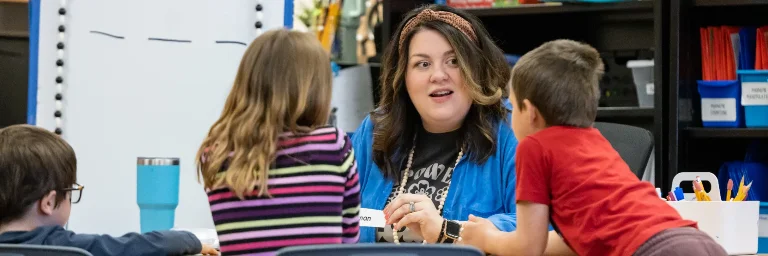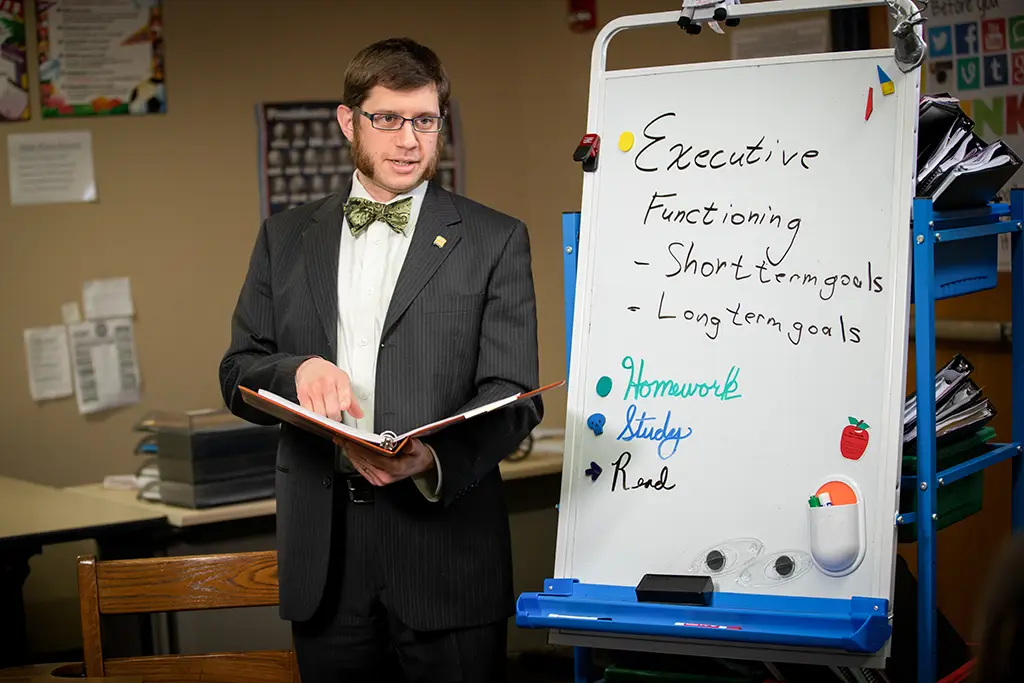
How To Become a Special Education Teacher
Special education teachers possess a deep understanding of the unique challenges encountered by students with special needs, allowing them to offer personalized support and guidance.
Request Information
To excel in this profession, individuals must meet specific requirements, including formal education, specialized training and, in some instances, licensure.
Under the federal Individuals with Disabilities Education Act (IDEA), students with special needs are entitled to appropriate education services. So, if you're passionate about making a difference in the lives of these students and ensuring they get a chance to fulfill their potential, read on as we provide a step-by-step guide on how to become a special education teacher, as well as more information related to this profession.
What is a Special Education Teacher?
Special education teachers are highly specialized educators trained to provide individualized support and instruction to students with diverse disabilities and learning challenges. In addition to academic growth, they focus on developing essential life skills such as problem-solving, motor skills and social interaction.
They often collaborate with a multidisciplinary team of professionals, including speech therapists, occupational therapists and psychologists, to ensure all students overcome obstacles and achieve their full potential.
What Does a Special Education Teacher Do?
Special education teachers encompass a wide range of responsibilities to foster academic growth, social development and emotional well-being. Some of their duties and contributions include:
- Developing and implementing Individualized Education Programs (IEPs) for students with disabilities, outlining personalized goals, accommodations and instructional strategies.
- Adapting teaching methods and materials to meet the unique learning styles and abilities of students, ensuring equitable access to education.
- Collaborating with general education teachers, parents and support staff to create inclusive learning environments and facilitate seamless transitions for students.
- Providing direct instruction in academic subjects, life skills and social-emotional learning, addressing individualized goals outlined in IEPs.
- Monitoring student progress through ongoing assessment and data analysis, adjusting instructional strategies and interventions as needed.
- Advocating for students' rights and educational needs within the school community and beyond, serving as a liaison between families, school administrators and support agencies.
- Fostering a supportive and inclusive classroom culture that promotes acceptance, empathy and respect.
- Continuously pursuing professional development opportunities to enhance knowledge and skills in special education practices and instructional methodologies.
How to Become a Special Education Teacher
Special education teacher requirements vary based on whether you seek employment in public or private schools. For example, state licensure is typically mandatory in public schools, whereas private schools offer more flexibility. Nevertheless, we'll go through the key steps to ensure specialization in special education regardless of the sector.

1. Earn a Bachelor's Degree
To become a special education teacher, you must pursue a bachelor's degree program in education. This degree provides a strong foundation for aspiring special education teachers. The program usually takes four years to complete and covers various subjects, from biology and mathematics to educational psychology and classroom management.
You can specialize in special education with an undergraduate certificate in Special Education or a minor in Special Education.
2. Gain Practical Experience
Experience is integral to the development of special education teachers, culminating in a 16-week teaching internship. This hands-on experience, divided into three phases, allows aspiring teachers to observe, assist and ultimately lead instruction under the guidance of a cooperating special education teacher.
Phase One
In the initial week of student teaching, aspiring special education teachers immerse themselves in the school environment, familiarizing themselves with essential procedures and protocols. They observe daily routines, administrative processes and classroom dynamics, gaining a foundational understanding of their role within the educational setting.
Phase Two
Spanning approximately ten weeks, the second phase of student teaching marks a significant transition as training teachers assume more prominent roles in classroom instruction. With guidance from the cooperating teacher, they engage in various teaching activities, ranging from individualized tutoring sessions to co-teaching alongside experienced educators.
Phase Three
The final two weeks of student teaching are dedicated to reflection, evaluation and synthesis of learning experiences. During this period, training teachers engage in introspection, critically evaluating their performance, strengths and areas for growth. They review feedback from mentors, peers and supervisors, identifying successes and challenges encountered throughout the internship.
3. Get Licensed
You will need to be licensed, both as a teacher and special ed instructor, with some states offering specialized certification for different types of disabilities. The requirements for receiving certification as a special education teacher vary by state.
This licensure process typically encompasses several essential components, including holding a relevant degree, passing a comprehensive background check and demonstrating proficiency by passing the Praxis II exam. These requirements collectively validate educators' qualifications and readiness to teach, assuring students, parents and administrators alike.
Private schools have varying criteria for hiring educators, generally offering more flexibility in licensure requirements. Still, many institutions prioritize hiring educators with relevant qualifications and experience to maintain educational standards and meet the needs of their student population.
4. Consider a Master's Degree
While not obligatory, some employers prefer or require a master's in special education. Pursuing a Special Education M.S./M.Ed. degree allows candidates to specialize in specific areas of special needs teaching and gain advanced training in curriculum development and instructional methodologies.
Whether aspiring toward a career in research with an M.S. degree or seeking to refine classroom teaching skills with an M.Ed., a master's degree offers valuable opportunities for professional growth and advancement.
Another viable pathway is the accelerated Bachelor of General Studies (B.G.S.)/Master's in Special Education (M.Ed.) 4+1 program. This innovative program allows students to complete both a bachelor's and master's degree at an accelerated pace, typically in five years. This option is ideal for those who wish to quickly transition from undergraduate to graduate studies, gaining advanced expertise and credentials in special education more rapidly.
What Skills Does a Special Education Teacher Need?
To effectively support and nurture their students, special educators must possess a unique set of skills tailored to the nature of the classroom environment.
Communication Skills
Facilitating effective interaction is a crucial part of a special education teacher's job. They must be able to accurately convey information and instructions to their students while actively listening to understand their needs. Moreover, strong communication skills are essential for collaborating with families and caregivers and fostering partnerships that enhance students' educational experiences.

Compassion
Compassion is essential in building strong relationships within the special education classroom. It allows educators to connect with students on a deeper level by demonstrating understanding and empathy toward their diverse challenges and needs. By creating a compassionate learning environment, special educators can provide their students with a sense of support, value and understanding, thus fostering a sense of belonging and trust.
Organization
Effective organization is crucial for special educators to manage classroom resources, documents and student records efficiently. Organizational skills are essential for arranging desks and activity stations as well as managing paperwork and instructional materials. A well-organized classroom creates an environment that fosters learning and productivity.
Flexibility
Special education teachers also need to be flexible and able to respond to the changing needs of their students. This means adjusting their teaching methods and approaches to meet the diverse learning styles of their students and adopting innovative strategies to address new challenges.
Where Do Special Educators Work?
Special education teachers primarily work in schools across various educational levels, including pre-kindergarten, elementary, middle and secondary schools, encompassing public and private institutions.
However, their expertise extends beyond traditional classroom settings to encompass various environments. This may include:
- Early intervention programs conducted in homes, schools or community centers
- Specialized schools for students with special needs
- Residential facilities
- Health agencies
- Hospitals
- Clinics
Special Education Teacher Salary and Job Outlook
Special education teachers earn a median annual wage of $62,950. This figure represents the industry standard for this profession, acknowledging the specialized skills and expertise that these roles entail.
Looking ahead, the job outlook for special education teachers is expected to show little or no change from 2022 to 2032. However, despite limited overall employment growth, approximately 33,500 openings for special education teachers are projected each year, on average, over the next decade.
The Bottom Line
As a special education teacher, you'll have the power to create inclusive and supportive learning environments that enable students to thrive academically, socially and emotionally. By acquiring the necessary formal education, training and licensure, you'll be well-equipped to navigate the intricacies of this profession.
If you're passionate about making a significant impact in this vital area, the University of North Dakota offers cutting-edge programs to guide you. Our Special Education M.S./M.Ed. program is designed for those who seek to specialize in this rewarding field. Alternatively, if you're interested in a broader educational foundation with a focus on special education, our General Studies B.A. with a Special Education M.Ed. program could be the perfect fit.
FAQs
Special education teachers typically instruct students in core academic subjects. However, the specific subjects taught may vary depending on the student's grade level and individual needs. They may also collaborate with other educators to ensure a comprehensive education.
Many individuals are drawn to special education teaching due to a passion for making a positive impact on students' lives, particularly those with diverse learning needs. The desire to advocate for and support students with disabilities drives many to pursue this rewarding career path.
Benefits of being a special education teacher include the opportunity to make a meaningful difference in students' lives, the chance to develop strong relationships with students and their families as well as the satisfaction of overcoming challenges and fostering growth in students with diverse needs.